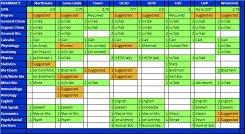Time to get into what it takes to become a pharmacy student (or as they refer to themselves, student pharmacists) at UCSF.
First, some fast facts:
- UCSF admitted precisely 122 students for the last term.
- 6 of those students came from the waitlist. (One of those students was driving on his way to a school in a different state when he got the call, and turned around.)
- The deadline for the application is November 2nd, eastern standard time. (But San Francisco is in the PST time zone? Weird. I know.)
- PCAT will not help you whatsoever. The admissions director claimed that he doesn't even know the meaning of the numbers as presented on the PharmCAS.
- Minimum GPA required as calculated by PharmCAS: 2.8
- The GPA of the previous class ranged from 2.96-3.97. Many 4.00 students applied, but they did not have the characteristics that they were looking for.
- You must complete and submit the PharmCAS and the Supplemental Application. Unlike some other schools, you are not supposed to wait for an invitation to turn in the Supplemental Application. You turn in both at before the deadline.
Some info specifically related to the Supplemental Application:
- It is available mid-July
- $$60 fee for domestic students, $80 for international students.
- No preference for submitting it early.
- It is suggested to take your time to make it as good as possible, but at the same time turn it in early enough so that if there is something wrong with it, it can be sent back and fixed to be resubmitted.
- If a student has to be denied, they would prefer the denial be based off of the application, and not a technicality, and will do their best to make sure that doesn't happen.
- Suggested date to turn in an application is October 1st.
More fast facts:
- Over 1,600 applicants this past cycle.
- About 200 more applicants apply every year.
- 275 were invited to an interview (17.2%)
- Once again, 122 accepted. (44.4% of those interviewed)
- 99% had a bachelor's degree
- 3.55 average GPA
- 3.47 average GPA
Admissions Timeline:
- June 1 - PharmCAS available
- Mid-July - Supplemental Application Available
- Nov 2 - Application Deadline
- Nov/Dec - Initial review
- Dec/Jan - notify 95% of potential students to be interviewed
- End of Jan - Interviews begin
- Jan/Feb - Interviews conducted in SF
- Feb/March - Admission Committee review
- April - Decisions mailed
Admissions Beyond the Numbers
- UCSF wants to prepare students be become leaders in pharmacy
- GPA is only one factor (This is something that was repeated in various forms multiple times throughout the presentation.)
- Other important factors include: Communication skills, Leadership potential, Community service, and Health Care experience
USCF is looking for:
- Strong and detailed letters of recommendation
- Detailed biographical information
- Well written and thought provoking statements
- A confident interview and good interview essay
- Demonstration of personal motivation through: Community service and volunteer work, a knowledge of pharmacy and health care, and excellent communication skills.
Discussion points:
1) Preparation begins now
2) Select individuals to write letters of recommendation
3) Take time to prepare your essay
4) Be able to communication what you will be able to add to the class and to the program
5) Make sure your application looks professional. Double check for spelling and grammar. Mistakes demonstrate a lack of attention to detail.
6) Know how to answer the question "Why pharmacy?"
7) Q: What if my GPA is below average? A: If you take one thing from this presentation remember that GPA is only one thing we look at. Focus on the things that you have control over.
8) Q: Do I have to be a biology, chemistry, or biochemistry major? A: No.
9) Q: What about extenuating circumstances? A: The application is very detailed. We take a holistic view of the application.
10) Have some experience in pharmacy or health care.
11) If invited, prepare for interviews!
You can read the admissions blog at
pharmdadmission.ucsf.edu. It contains helpful hints, funny stories, and an insider's view.
Back to the GPA issue
I can't stress enough how many times it was said that GPA is only one factor, our admission process just doesn't work that way, we take a holistic view of the application, etc. It was mentioned, in various ways, ten or so times over the course of the one hour and twenty minutes before the student panel began.
He really wanted to make sure that it was understood that GPA alone does not make a good candidate. There is much more to a student than just that. Coming away from the presentation, I definitely left with more hope about being able to get into pharmacy school.




















